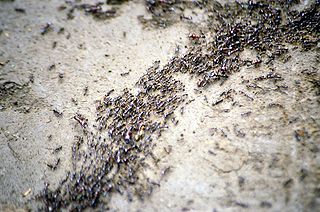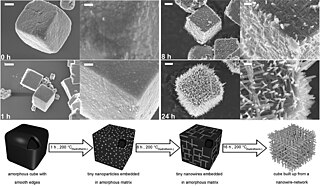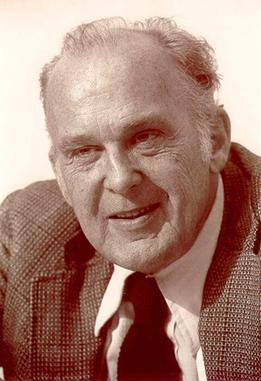A meme is an idea, behavior, or style that spreads by means of imitation from person to person within a culture and often carries symbolic meaning representing a particular phenomenon or theme. A meme acts as a unit for carrying cultural ideas, symbols, or practices, that can be transmitted from one mind to another through writing, speech, gestures, rituals, or other imitable phenomena with a mimicked theme. Supporters of the concept regard memes as cultural analogues to genes in that they self-replicate, mutate, and respond to selective pressures. In popular language, a meme may refer to an Internet meme, typically an image, that is remixed, copied, and circulated in a shared cultural experience online.
Memetics is a theory of the evolution of culture based on Darwinian principles with the meme as the unit of culture. The term ‘meme’ was coined by biologist Richard Dawkins in his 1976 book The Selfish Gene, to illustrate the principle that he later called ‘Universal Darwinism’. All evolutionary processes depend on information being copied, varied, and selected; a process also known as variation with selective retention. The information that is copied is called the replicator, and genes are the replicator for biological evolution. Dawkins proposed that the same process drives cultural evolution, and he called this second replicator the ‘meme’. He gave as examples, tunes, catchphrases, fashions, and technologies. Like genes, memes are selfish replicators and have causal efficacy, in other words their properties influence their chances of being copied and passed on. Some succeed because they are valuable or useful to their human hosts while others are more like viruses.

Stigmergy is a mechanism of indirect coordination, through the environment, between agents or actions. The principle is that the trace left in the environment by an individual action stimulates the performance of a succeeding action by the same or different agent. Agents that respond to traces in the environment receive positive fitness benefits, reinforcing the likelihood of these behaviors becoming fixed within a population over time.

Self-organization, also called spontaneous order in the social sciences, is a process where some form of overall order arises from local interactions between parts of an initially disordered system. The process can be spontaneous when sufficient energy is available, not needing control by any external agent. It is often triggered by seemingly random fluctuations, amplified by positive feedback. The resulting organization is wholly decentralized, distributed over all the components of the system. As such, the organization is typically robust and able to survive or self-repair substantial perturbation. Chaos theory discusses self-organization in terms of islands of predictability in a sea of chaotic unpredictability.
Bio-inspired computing, short for biologically inspired computing, is a field of study which seeks to solve computer science problems using models of biology. It relates to connectionism, social behavior, and emergence. Within computer science, bio-inspired computing relates to artificial intelligence and machine learning. Bio-inspired computing is a major subset of natural computation.
A complex adaptive system is a system that is complex in that it is a dynamic network of interactions, but the behavior of the ensemble may not be predictable according to the behavior of the components. It is adaptive in that the individual and collective behavior mutate and self-organize corresponding to the change-initiating micro-event or collection of events. It is a "complex macroscopic collection" of relatively "similar and partially connected micro-structures" formed in order to adapt to the changing environment and increase their survivability as a macro-structure. The Complex Adaptive Systems approach builds on replicator dynamics.
Evolutionary epistemology refers to three distinct topics: (1) the biological evolution of cognitive mechanisms in animals and humans, (2) a theory that knowledge itself evolves by natural selection, and (3) the study of the historical discovery of new abstract entities such as abstract number or abstract value that necessarily precede the individual acquisition and usage of such abstractions. As a branch of inquiry in epistemology, evolutionary epistemology lies at the crossroads of philosophy and evolutionary biology.

Valentin Fyodorovich Turchin was a Soviet and American physicist, cybernetician, and computer scientist. He developed the Refal programming language, the theory of metasystem transitions and the notion of supercompilation. He was as a pioneer in artificial intelligence and a proponent of the global brain hypothesis.
A metasystem transition is the emergence, through evolution, of a higher level of organization or control.

Donald Thomas Campbell was an American social scientist. He is noted for his work in methodology. He coined the term evolutionary epistemology and developed a selectionist theory of human creativity. A Review of General Psychology survey, published in 2002, ranked Campbell as the 33rd most cited psychologist of the 20th century.
The Red Queen's hypothesis is a hypothesis in evolutionary biology proposed in 1973, that species must constantly adapt, evolve, and proliferate in order to survive while pitted against ever-evolving opposing species. The hypothesis was intended to explain the constant (age-independent) extinction probability as observed in the paleontological record caused by co-evolution between competing species; however, it has also been suggested that the Red Queen hypothesis explains the advantage of sexual reproduction at the level of individuals, and the positive correlation between speciation and extinction rates in most higher taxa.
Principia Cybernetica is an international cooperation of scientists in the field of cybernetics and systems science, especially known for their website, Principia Cybernetica. They have dedicated their organization to what they call "a computer-supported evolutionary-systemic philosophy, in the context of the transdisciplinary academic fields of Systems Science and Cybernetics".
Ephemeralization, a term coined by R. Buckminster Fuller in 1938, is the ability of technological advancement to do "more and more with less and less until eventually you can do everything with nothing," that is, an accelerating increase in the efficiency of achieving the same or more output while requiring less input. The application of materials and technology in modern cell phones, compared to older computers and phones, exemplify the concepts of Ephemeralization whereby technological advancement can drive efficiency in the form of fewer materials being used to provide greater utility. Fuller's vision was that ephemeralization, through technological progress, could result in ever-increasing standards of living for an ever-growing population. The concept has been embraced by those who argue against Malthusian philosophy.

The global brain is a neuroscience-inspired and futurological vision of the planetary information and communications technology network that interconnects all humans and their technological artifacts. As this network stores ever more information, takes over ever more functions of coordination and communication from traditional organizations, and becomes increasingly intelligent, it increasingly plays the role of a brain for the planet Earth. In the philosophy of mind, global brain finds an analog in Averroes's theory of the unity of the intellect

The Red Queen is a fictional character and the main antagonist in Lewis Carroll's fantasy 1871 novel Through the Looking-Glass. She is often confused with the Queen of Hearts from the previous book Alice's Adventures in Wonderland (1865), although the two are very different.
Universal Darwinism, also known as generalized Darwinism, universal selection theory, or Darwinian metaphysics, is a variety of approaches that extend the theory of Darwinism beyond its original domain of biological evolution on Earth. Universal Darwinism aims to formulate a generalized version of the mechanisms of variation, selection and heredity proposed by Charles Darwin, so that they can apply to explain evolution in a wide variety of other domains, including psychology, linguistics, economics, culture, medicine, computer science, and physics.

Cliff Joslyn is an American mathematician, cognitive scientist, and cybernetician. He is currently the Chief Knowledge Scientist at the Pacific Northwest National Laboratory in Seattle, Washington, US, and visiting professor of Systems Science at Binghamton University (SUNY).
The concept of conscious evolution refers to the theoretical ability of human beings to become conscious participants in the evolution of their cultures, or even of the entirety of human society, based on a relatively recent combination of factors, including increasing awareness of cultural and social patterns, reaction against perceived problems with existing patterns, injustices, inequities, and other factors. The realization that cultural and social evolution can be guided through conscious decisions has been in increasing evidence since approximately the mid-19th century, when the rate of cultural change globally began to increase dramatically. The Industrial Revolution, reactions against the effects of the Industrial Revolution, the emergence of new sciences such as psychology, anthropology, and sociology, the revolution in global communication, the interaction of diverse cultures through transportation and colonization, anti-slavery and suffrage movements, and increasing human lifespan all would contribute to the growing awareness of social and cultural patterns as being potentially subject to conscious evolution.

Artificial life is a field of study wherein researchers examine systems related to natural life, its processes, and its evolution, through the use of simulations with computer models, robotics, and biochemistry. The discipline was named by Christopher Langton, an American theoretical biologist, in 1986. In 1987 Langton organized the first conference on the field, in Los Alamos, New Mexico. There are three main kinds of alife, named for their approaches: soft, from software; hard, from hardware; and wet, from biochemistry. Artificial life researchers study traditional biology by trying to recreate aspects of biological phenomena.








